Rob Bignell's Blog, page 265
April 4, 2016
Eight tips for writing interesting dialogue
Among 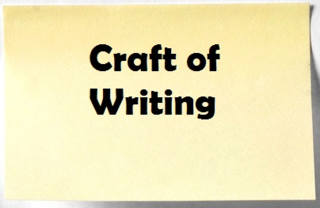 the most difficult elements to write in any story is dialogue. There���s a fine art to ensuring that it doesn���t slow the narrative and come off as dull.
the most difficult elements to write in any story is dialogue. There���s a fine art to ensuring that it doesn���t slow the narrative and come off as dull.
Good dialogue generally contains eight features.
Moves the story forward
Interesting dialogue centers on characters working toward achieving their goals. If their words don���t arise from their motivations, then it���s just filler. In short, there must be a point to the dialogue.
Shows the characters��� thoughts and feelings regarding their motivations and goals
Readers will be able to infer what a character desires and attempting to achieve by what they say. The alternative is characters spouting exposition, which always slows the story.
Sounds natural
Dialogue will read as people would speak, which typically is less formal than how they would write. Hence, it���s okay to use improper grammar, so long as it sounds authentic.
���but not too natural Because dialogue needs to be tight and concise, no words can be wasted. Always get rid of the ���ums,��� ���uhs��� and ���wells��� in written dialogue.
Get the punctuation right
Even if the dialogue is tightly written, not using quotation marks and commas correctly can make it confusing to read. And don���t go crazy with the punctuation ��� a single exclamation point rather than three of them will do when a character shouts.
Use attribution only if needed
There���s no need to tell who is speaking after every line is delivered when there are only two speakers. Doing so slows the pace and distracts readers from what the characters said.
Avoid telling how character spoke
Dump the verbs that describe how they spoke (shouted, sobbed, laughed) and the adverbs (said jokingly, said cruelly). The words in the dialogue should infer to readers the character���s tone of voice.
Don���t overdescribe in the text surrounding dialogue
Too many details in the text during a dialogue exchange can distract readers from what the characters said. For example, readers usually don���t need to know how a person is standing; the words a character spoke should suggest his stance.
Professional Book Editor: Having your novel, short story or nonfiction manuscript proofread or edited before submitting it can prove invaluable. In an economic climate where you face heavy competition, your writing needs a second eye to give you the edge. I can provide that second eye.
<A HREF="http://ws-na.amazon-adsystem.com/widg... Widgets</A>
Related articles
 How to properly punctuate dialogue
How to properly punctuate dialogue Five Great Quotations about Short Stories
Five Great Quotations about Short Stories Three ebook formatting tips, part VII
Three ebook formatting tips, part VII
April 3, 2016
Five Great Quotations about the Writing Life
���And what 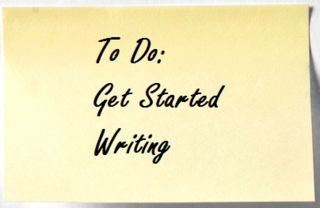 is wrong with playing with words? Words love to be played with, just like children or kittens do!��� - David Almond
is wrong with playing with words? Words love to be played with, just like children or kittens do!��� - David Almond
���Who���s to say what a ���literary life��� is? As long as you are writing often, and writing well, you don���t need to be hanging-out in libraries all the time. Nightclubs are great literary research centers. So is Ibiza!��� - Roman Payne
���You can, of course, write to inspire others���but most importantly, you must write to inspire yourself.��� - Jessica Swan
���If there weren���t so many interesting conversations taking place inside my head, I might venture to speak out loud.��� - Richelle E. Goodrich
���Becoming a writer is about becoming conscious. When you're conscious and writing from a place of insight and simplicity and real caring about the truth, you have the ability to throw the lights on for your reader.��� - Anne Lamott
Professional Book Editor: Having your novel, short story or nonfiction manuscript proofread or edited before submitting it can prove invaluable. In an economic climate where you face heavy competition, your writing needs a second eye to give you the edge. I can provide that second eye.
&amp;amp;lt;A HREF="http://ws-na.amazon-adsystem.com/widg... Widgets&amp;amp;lt;/A&amp;amp;gt;
Related articles
 Five Great Quotations about Why We Write
Five Great Quotations about Why We Write Five Great Quotations about Theme
Five Great Quotations about Theme Promote your book by hosting guest bloggers
Promote your book by hosting guest bloggers Common questions about publishing ebooks
Common questions about publishing ebooks
April 2, 2016
Long-time editing client publishes his third novel
A long-time 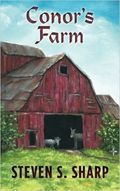 editing client, Steven S. Sharp, has published his third novel, ���Conor���s Farm.���
editing client, Steven S. Sharp, has published his third novel, ���Conor���s Farm.���
The O���Farrell Family Farm in Santa Rosa, California, was a lush, serene homestead when operated with love by its namesakes. But after several family tragedies, 12-year-old Conor O���Farrell is forced to live with his evil stepfather, Hess McAlister, who seemingly inherits the farm. Hess is a violent and abusive alcoholic with a hidden past, and he uses Conor to work the land like an indentured Irish laborer. Conor cherishes the property and its animals but is trapped in an unloving and cruel home life. When three young friends defend Conor against abuse, it leads to a bloody confrontation that turns Hess into a fugitive. '
Without options, Conor goes to live with relatives in Iowa. Many hearts are broken, but hope is never lost that Conor will return home one day. The years progress quickly as the lonely farm enters a long probate period and fights for its life against the environment���s natural selection. Will Hess McAlister ever be captured? Will Conor ever return home? Can the farm survive its respective battle for life?
The book is available online in paperback. All of the proceeds will go to Saint Jude Children���s Hospital.
Professional Book Editor: Having your novel, short story or nonfiction manuscript proofread or edited before submitting it can prove invaluable. In an economic climate where you face heavy competition, your writing needs a second eye to give you the edge. I can provide that second eye.
&amp;lt;A HREF="http://ws-na.amazon-adsystem.com/widg... Widgets&amp;lt;/A&amp;gt;
Related articles
 Writing Prompt: Random words
Writing Prompt: Random words Common questions about publishing ebooks
Common questions about publishing ebooks Editing client publishes her first urban novel
Editing client publishes her first urban novel
April 1, 2016
Utilize Pinterest to generate book sales
Among the  most popular social media today is Pinterest. If you haven���t used Pinterest before, it���s fairly simple (and cool!). Imagine that you have a bulletin board hanging on your wall. When you see something you like ��� a favorite quotation, a scenic picture of a place you want to go, a pic of your favorite actor ��� you clip it from the magazine or newspaper and pin it to your bulletin board. With Pinterest, you do the same thing, except you���re pinning pictures from different websites on a virtual bulletin board, and the photo includes a link to the website it came from. You also can have several bulletin boards (one for each interest) on your virtual wall. Other people ��� even if not on Pinterest ��� can peruse these boards as well.
most popular social media today is Pinterest. If you haven���t used Pinterest before, it���s fairly simple (and cool!). Imagine that you have a bulletin board hanging on your wall. When you see something you like ��� a favorite quotation, a scenic picture of a place you want to go, a pic of your favorite actor ��� you clip it from the magazine or newspaper and pin it to your bulletin board. With Pinterest, you do the same thing, except you���re pinning pictures from different websites on a virtual bulletin board, and the photo includes a link to the website it came from. You also can have several bulletin boards (one for each interest) on your virtual wall. Other people ��� even if not on Pinterest ��� can peruse these boards as well.
As an author, you definitely can leverage Pinterest to sell your books. This works particularly well for nonfiction books.
Suppose you write books about skiing. You could create several (bulletin) boards at your Pinterest home page. One might be on different ski trails, another on skiing gear, another on downhill skiing topics, another on cross-country skiing topics, maybe one on skiing celebrities. As you write blog entries about these various topics, be sure to include a picture with that post. When the blog entry goes live, pin it to the appropriate Pinterest board. Along with that pin, you can add text that pitches your book, such as ���Learn more about Colorado ski trails at (URL)���; the URL then would send them to the Amazon.com page that sells your book.
In addition to blog entries, you might pin your books��� actual covers with the link leading to their Amazon.com page. Or if you���ve written an article for another blog, a newspaper, or a magazine, pin that. You might even pin other articles that people have posted.
Pinterest works as a sales tool because interesting photos grab people���s attention. Once they see something that piques their interest, they���ll take a closer look by clicking onto your blog or web page. In addition, each Pinterest photo gives you another entry point on search engines to your book. As search engines include your picture on their ���Images��� listings, this can lead to higher blog visits and ultimately book sales. Hashtags also can be used on Pinterest.
If you set up a Pinterest page for your books, be sure to use the same name as you do across your author���s platform. So, if your blog is called ���Ski Demon���, then use ���Ski Demon��� for your Pinterest page. Also, should you already have a Pinterest page that you use for personal purposes (with boards for favorite hairstyles, great kitchen designs, and everything Rick Astley), don���t mix it with boards promoting your books. Instead, to avoid confusing those visiting your home page, create a new Pinterest page.
Professional Book Editor: Having your novel, short story or nonfiction manuscript proofread or edited before submitting it can prove invaluable. In an economic climate where you face heavy competition, your writing needs a second eye to give you the edge. I can provide that second eye.
<A HREF="http://ws-na.amazon-adsystem.com/widg... Widgets</A>
Related articles
 How to best use hashtags on Pinterest
How to best use hashtags on Pinterest Use link shortneers for tidier promotions
Use link shortneers for tidier promotions Stuff your book in a Little Free Library
Stuff your book in a Little Free Library
March 31, 2016
How to set up a bank account for your book sales
If as a 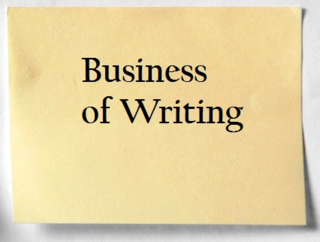 self-published author you wish to separate your book sales from your personal income, you���ll need to keep separate bank accounts. Getting a bank account for your royalties, however, is a bit more complicated than simply going to the bank and opening one.
self-published author you wish to separate your book sales from your personal income, you���ll need to keep separate bank accounts. Getting a bank account for your royalties, however, is a bit more complicated than simply going to the bank and opening one.
Generally, you���ll need to ensure your business has a different name than you. You can use your name as part of the business, however. So, if your name is Jane Doe, your business can���t be ���Jane Doe��� but it could be ���Jane Doe Publishing��� or ���Jane Doe Press.���
Next, you���ll need to complete and file a
Then bring the FBNS to your bank and set up an account. You may need to deposit some of your own personal money for the minimum balance to get an account started.
Once that is done, you then can set up PayPal or credit card accounts using your business��� bank account, presuming that they are needed.
Remember that every state and bank deals with creating a business account a little differently. Typically a bank official or information provided online by your state, county or city will explain the process as well.
The advantages of keeping separate accounts are primarily for taxes. If you���re earning a ton of money from book sales, you want the separation so you can take advantage of various tax benefits. You also may want to keep separate accounts for your own personal comfort so you can better track your book earnings or to use only those dollars for book-related expenses, such as paying for editing services.
Professional Book Editor: Having your novel, short story or nonfiction manuscript proofread or edited before submitting it can prove invaluable. In an economic climate where you face heavy competition, your writing needs a second eye to give you the edge. I can provide that second eye.
&lt;A HREF="http://ws-na.amazon-adsystem.com/widg... Widgets&lt;/A&gt;
Related articles
 Self-published authors may need EIN
Self-published authors may need EIN Co-authors can form 'general partnership'
Co-authors can form 'general partnership' Does a self-published author need to incorporate?
Does a self-published author need to incorporate? Q&A with Inventing Reality Editor Rob Bignell
Q&A with Inventing Reality Editor Rob Bignell
March 30, 2016
Editing client publishes dating/relationship book
A recent  editing client, Cindy de la Garza, has published her first book, ���Things People Don���t Tell You If You Marry After 30.��� In the book, de la Garza lays out the arguments as to why women shouldn���t ignore their biological clock if they want to have children. The book, which can be read in one sitting, shows how to get serious about finding your soul mate without having to compromise your professional career. de la Garza includes a number of her own experiences to make the case for marrying sooner rather than later. The book is available online in paperback and ebook.
editing client, Cindy de la Garza, has published her first book, ���Things People Don���t Tell You If You Marry After 30.��� In the book, de la Garza lays out the arguments as to why women shouldn���t ignore their biological clock if they want to have children. The book, which can be read in one sitting, shows how to get serious about finding your soul mate without having to compromise your professional career. de la Garza includes a number of her own experiences to make the case for marrying sooner rather than later. The book is available online in paperback and ebook.
Professional Book Editor: Having your novel, short story or nonfiction manuscript proofread or edited before submitting it can prove invaluable. In an economic climate where you face heavy competition, your writing needs a second eye to give you the edge. I can provide that second eye.
&amp;lt;A HREF="http://ws-na.amazon-adsystem.com/widg... Widgets&amp;lt;/A&amp;gt;
Related articles
 What are the different levels of editing?
What are the different levels of editing? Common questions about publishing ebooks
Common questions about publishing ebooks Promote your book by hosting guest bloggers
Promote your book by hosting guest bloggers Writing Inspiration: Revise and continue
Writing Inspiration: Revise and continue Writing Inspiration: Seek another's advice
Writing Inspiration: Seek another's advice
March 29, 2016
Four Writing Prompts - Inflexibility
Good stories 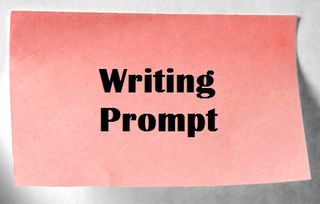 center on the clashing of characters��� goals and motivations. Sometimes a character���s goals and motivations arise from their infelxibility. Here are four writing prompts for stories that involve the trait of inflexibility.
center on the clashing of characters��� goals and motivations. Sometimes a character���s goals and motivations arise from their infelxibility. Here are four writing prompts for stories that involve the trait of inflexibility.
Man vs. nature
An explorer of a great wilderness area refuses to give up the trappings of civilization/his military organization despite that it���s hampering the journey. Why won���t he give up his notions of civilization/hierarchy? Will his inflexibility ultimately doom him, given the wilderness��� unyielding stressors?
Man vs. man
Our main character cannot understand why his spouse wants him to be something he isn���t (or even wants to be). How does he handle his spouse���s criticism, and what can he do to get his spouse to acknowledge his wants and needs?
Man vs. society
The main character ��� a younger man ��� wants to do something/go into a career that his parents and those around him in society ��� neighbors, former teachers, parents��� coworkers, even his friends ��� object to. Will he cave to their pressure or become what he wants to be, even if it means being on his own?
Man vs. himself
Our main character discovers something that a loved one ��� perhaps his child ��� that he cannot forgive/accept. Why is he so inflexible? Can he find a way to be accepting of his loved one, or will he live a life in which both suffer from the isolation of one another?
Professional Book Editor: Having your novel, short story or nonfiction manuscript proofread or edited before submitting it can prove invaluable. In an economic climate where you face heavy competition, your writing needs a second eye to give you the edge. I can provide that second eye.
&amp;amp;amp;lt;A HREF="http://ws-na.amazon-adsystem.com/widg... Widgets&amp;amp;amp;lt;/A&amp;amp;amp;gt;
Related articles
 Today's Writing Inspiration: Your first written sentence is the foundation of all of your dreams
Today's Writing Inspiration: Your first written sentence is the foundation of all of your dreams Lit term 'man vs. man' isn't gender specific
Lit term 'man vs. man' isn't gender specific Questions to ask yourself when plotting a story
Questions to ask yourself when plotting a story
March 28, 2016
Build rising action scenes around conflict
Anytime you���re 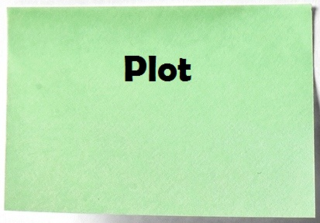 writing a scene in the story���s rising action, you���ll want to treat it as a short story in and of itself. That means focusing on conflict.
writing a scene in the story���s rising action, you���ll want to treat it as a short story in and of itself. That means focusing on conflict.
All too often when editing such scenes for my clients, I find that it���s written a bit too much like first-they-did-this-then-they-did-that, focusing a lot on the setting and the reason for the story to occur at that location. For example, perhaps in a story is about a couple having difficulties in their marriage the scenes would unfold as ���couple must sign a house title, so they are at the title office; next, they go home, so they are at their new home.��� Such scenes will read very slowly and if kept up will send the reader to another book with a quicker pace.
Instead, always think conflict-conflict-conflict. Before writing, ask yourself: What is the scene���s primary conflict? What is the best way for characters to experience this conflict? And where is the best place for this conflict to be experienced?
As drafting, the writer could start the scene by asking what is the central problem the husband faces in it. Perhaps it���s growing tension with his wife because of his discomfort that she is making decisions without him. Infer that conflict immediately to the reader, right in the opening sentence.
Next, think of the rest of the scene in terms of how can the husband overcome that central problem, that is, how can he dampen the tension. So he tries to do that. It helps a little. But the wife does something or he sees something she���s done that upsets him without his input, and he���s back to square one.
So the husband tries again, in a different way. Except maybe this time the wife is still upset about him just getting angry with her. So the tension increases; maybe harsh words are exchanged. Then she takes a deep breath, realizes she���s losing her temper and stops. She tries to make up. But the harsh words still sting for the husband, and despite the opportunity to make up, he won���t.
Now something occurs that brings delight individually to both husband and wife. He notices this, decides to try again at decreasing the tension. It works. They apologize to one another, mutually decide to put behind them the harsh words they exchanged, to make decisions together. The husband feels as if he knows what he has to do to make this work. The scene appears to end well.
But at the very end, give just a hint of the wife doing something that annoys the husband, hinting that their problems aren���t really over. After all, if all ends rosy, there���s no need to have another scene or chapter.
The conflict need not make the characters sound like a jerk (husband) or a bitch (wife). They want to get along but don���t know how (Perhaps because they don���t realize that their own inner flaws are getting in the way). When they figure out the latter in the story, they���ll get along and the conflict will be resolved.
Related articles:
��� General guidelines for constructing a scene in a story
��� Ways a main character can try but fail to resolve a central problem
Professional Book Editor: Having your novel, short story or nonfiction manuscript proofread or edited before submitting it can prove invaluable. In an economic climate where you face heavy competition, your writing needs a second eye to give you the edge. I can provide that second eye.
&lt;A HREF="http://ws-na.amazon-adsystem.com/widg... Widgets&lt;/A&gt;
Related articles
 Writing inspiration: Model a story
Writing inspiration: Model a story Today's Writing Inspiration: Your first written sentence is the foundation of all of your dreams
Today's Writing Inspiration: Your first written sentence is the foundation of all of your dreams Writing Prompt: Try something risky
Writing Prompt: Try something risky Writing Prompt: Start with last line
Writing Prompt: Start with last line
March 27, 2016
Five Great Quotations about Writer���s Block
���If you 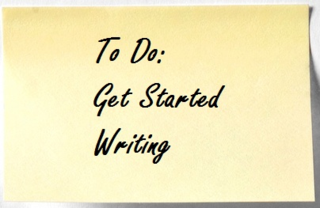 let conditions stop you from working, they���ll always stop you.��� - James T. Farrell
let conditions stop you from working, they���ll always stop you.��� - James T. Farrell
���I think the best advice on writing I���ve received was from John Steinbeck, who suggested that one way to get around writer���s block (which I was suffering hideously at the time) was to pretend to be writing to an aunt, or a girl friend. I did this, writing to an actress friend I knew, Jean Seberg. The editors of Harpers forgot to take off the salutation and that���s how the article begins in the magazine: Dear Jean...��� - George Plimpton
���Talent is a faucet. When it is on, one must write. Inspiration is a farce that poets have invented to give themselves importance.��� - Jean Anouilh
���Man, wow, there���s so many things to do, so many things to write! How to even begin to get it all down and without modified restraints and all hung-up on like literary inhibitions and grammatical fears...��� - Jack Kerouac
���Writer���s block, I just drove around it four times. All my favorite writers live there.��� - Jarod Kintz
Professional Book Editor: Having your novel, short story or nonfiction manuscript proofread or edited before submitting it can prove invaluable. In an economic climate where you face heavy competition, your writing needs a second eye to give you the edge. I can provide that second eye.
&amp;amp;amp;amp;amp;amp;amp;lt;A HREF="http://ws-na.amazon-adsystem.com/widg... Widgets&amp;amp;amp;amp;amp;amp;amp;lt;/A&amp;amp;amp;amp;amp;amp;amp;gt;
Related articles
 Five Great Quotations about Craft of Writing
Five Great Quotations about Craft of Writing Five Great Quotations about Editing
Five Great Quotations about Editing Five Great Quotations about Readers
Five Great Quotations about Readers
March 26, 2016
Writing affirmation: Every page counts
All too 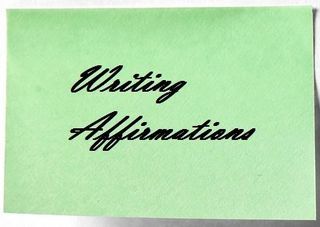 often the enormity of writing a novel or a nonfiction book overwhelms writers. They may have spent a week writing an hour each day, come up with only 2500 words, and think they���ll never finish the task. It���s akin to driving through rush hour traffic and wondering if you���ll ever get through this.
often the enormity of writing a novel or a nonfiction book overwhelms writers. They may have spent a week writing an hour each day, come up with only 2500 words, and think they���ll never finish the task. It���s akin to driving through rush hour traffic and wondering if you���ll ever get through this.
At such times, remind yourself not to focus on the final project. While that ultimately is your goal, instead center your attention on the little goals ��� a paragraph, a section, a chapter ��� needed to reach that big goal. It���s like focusing on the mile markers rather than the final destination when driving.
Consider that there really are two types of goals you can have in writing (or any other project, for that matter). An outcome goal is the end result; a process goal is an individual step taken to reach that outcome. So in writing, an outcome goal would be ���I will write a novel���; a process goal would be ���I will write twice a day.���
Always concentrate on achieving a process goal, not the outcome goal. This shifts the focus from success/failure to taking small steps needed to achieve your goal. If you focus on the outcome, every day until you actually publish your book will be a ���failure.��� Instead, celebrate your success at accomplishing a process goal, which always is easier to achieve.
Indeed, if you do ���less��� (a process goal), you can do something more slowly, deliberately and completely. Your mind will not race around trying to think of how to describe the setting in the next scene or what a character will do four chapters from now.
And ultimately, after you���ve achieved each process goal, you will achieve your outcome goal. Every page ��� just like every nudge forward in a traffic jam ��� counts!
Professional Book Editor: Having your novel, short story or nonfiction manuscript proofread or edited before submitting it can prove invaluable. In an economic climate where you face heavy competition, your writing needs a second eye to give you the edge. I can provide that second eye.
<A HREF="http://ws-na.amazon-adsystem.com/widg... Widgets</A>
Related articles
 Writing Inspiration: Explore then strive
Writing Inspiration: Explore then strive Sales advantages of writing nonfiction books
Sales advantages of writing nonfiction books



